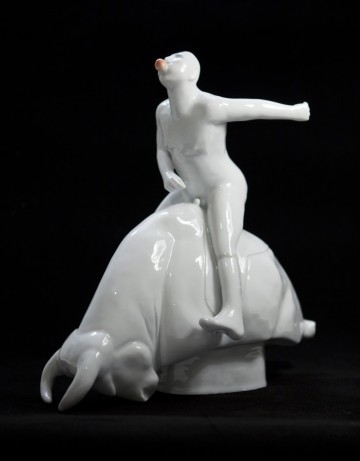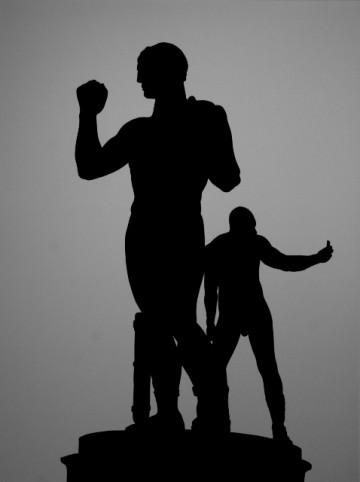Stefan Thiel |
Nadine Wottke
IF YOU CAN, GIVE ME LOVE
August 31, 2012 – October 13, 2012
The title is taken from the well-known song ‘If you can’t, give me love’ by Suzi Quatro from 1978. At that time a rocky ballade in which Quatro claims love from a little disco acquaintance: love, not a one-night-stand. Nobody could imagine what kind of changes the free love movement of the 60’s would bring – or would not bring. Triggered by the birth control pill free love set off to conquer rigid bourgeois morals. Along with the sexual freedom of the 70’s that changed and liberalized our love life political and social upheaval set off. The environmental, anti-nuclear, peace, feminist and gay movements are only a few examples. Our curiosity and desire nowadays is served and appeased by the sheer boundless amount of pictures in the Internet. Today sex whether real or virtual is available at all times.
And yet, it seems that the crux of love is the freedom and the unlimited possibilities we have. When it gets down to it, humans are real, are on their own and vulnerable. Thiel and Wottke peep audaciously behind the curtains of self-projection and self-discovery: disarming views of naked beings.
Starting from the 19th century ‘album amicorum’, that contained silhouettes of friends, Thiel connects to the present Facebook list of friends. His ‘Black Face Book’ shows homoerotic forms of self-presentation that he started to collect from the Internet and that he later staged and photographed. Album amicorum and Facebook have differing signs. While the silhouette was an acknowledgement of an existing friendship, the Facebook pictures are used to establish new relationships. And just like in an application one strives for a perfect and desirable presentation. Thiels fading out of photographic details, the step back to the silhouette, exposes the pattern of such a convention and requests us to fill the blank space with our own standards and phantasies.
Fantasies of our existential vulnerability and our hopes are mirrored in Wottkes Bone China figures. The man on the bull in ‘I don't want your freedom’ is revealing himself in a naked and passionate way: riding on a bull riding machine and leisurely blowing pink chewing gum. Wottke captures the short moment of insight when we stand naked in front of our inner eye and are able to recognise ourselves. The short moment in which, liberated of external and inner forces, we take a deep breath, let loose and understand. Hence, the naked bodies and fetish objects in Wottkes figures are not presenting sexual preferences but work as an emotional support recovering existential riddles.
Man, regarding questions of life and viability, has not changed much despite liberal forms of life and technical resources. It is not surprising that also the independent girl rocker Quatro was sighing for a romantic happy-end: ‘That ain’t enough....if you can't give me feelings with old fashioned meanings.’
And yet, it seems that the crux of love is the freedom and the unlimited possibilities we have. When it gets down to it, humans are real, are on their own and vulnerable. Thiel and Wottke peep audaciously behind the curtains of self-projection and self-discovery: disarming views of naked beings.
Starting from the 19th century ‘album amicorum’, that contained silhouettes of friends, Thiel connects to the present Facebook list of friends. His ‘Black Face Book’ shows homoerotic forms of self-presentation that he started to collect from the Internet and that he later staged and photographed. Album amicorum and Facebook have differing signs. While the silhouette was an acknowledgement of an existing friendship, the Facebook pictures are used to establish new relationships. And just like in an application one strives for a perfect and desirable presentation. Thiels fading out of photographic details, the step back to the silhouette, exposes the pattern of such a convention and requests us to fill the blank space with our own standards and phantasies.
Fantasies of our existential vulnerability and our hopes are mirrored in Wottkes Bone China figures. The man on the bull in ‘I don't want your freedom’ is revealing himself in a naked and passionate way: riding on a bull riding machine and leisurely blowing pink chewing gum. Wottke captures the short moment of insight when we stand naked in front of our inner eye and are able to recognise ourselves. The short moment in which, liberated of external and inner forces, we take a deep breath, let loose and understand. Hence, the naked bodies and fetish objects in Wottkes figures are not presenting sexual preferences but work as an emotional support recovering existential riddles.
Man, regarding questions of life and viability, has not changed much despite liberal forms of life and technical resources. It is not surprising that also the independent girl rocker Quatro was sighing for a romantic happy-end: ‘That ain’t enough....if you can't give me feelings with old fashioned meanings.’


